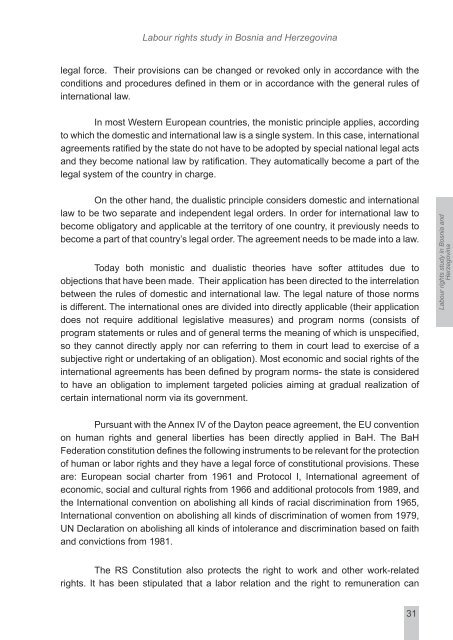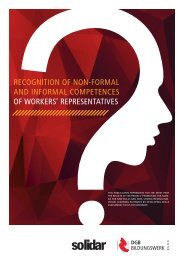ZAÅ TITA PRAVA U BOSNI I HERCEGOVINI - Solidar
ZAÅ TITA PRAVA U BOSNI I HERCEGOVINI - Solidar
ZAÅ TITA PRAVA U BOSNI I HERCEGOVINI - Solidar
Create successful ePaper yourself
Turn your PDF publications into a flip-book with our unique Google optimized e-Paper software.
Labour rights study in Bosnia and Herzegovina<br />
legal force. Their provisions can be changed or revoked only in accordance with the<br />
conditions and procedures defi ned in them or in accordance with the general rules of<br />
international law.<br />
In most Western European countries, the monistic principle applies, according<br />
to which the domestic and international law is a single system. In this case, international<br />
agreements ratified by the state do not have to be adopted by special national legal acts<br />
and they become national law by ratifi cation. They automatically become a part of the<br />
legal system of the country in charge.<br />
On the other hand, the dualistic principle considers domestic and international<br />
law to be two separate and independent legal orders. In order for international law to<br />
become obligatory and applicable at the territory of one country, it previously needs to<br />
become a part of that country’s legal order. The agreement needs to be made into a law.<br />
Today both monistic and dualistic theories have softer attitudes due to<br />
objections that have been made. Their application has been directed to the interrelation<br />
between the rules of domestic and international law. The legal nature of those norms<br />
is different. The international ones are divided into directly applicable (their application<br />
does not require additional legislative measures) and program norms (consists of<br />
program statements or rules and of general terms the meaning of which is unspecified,<br />
so they cannot directly apply nor can referring to them in court lead to exercise of a<br />
subjective right or undertaking of an obligation). Most economic and social rights of the<br />
international agreements has been defi ned by program norms- the state is considered<br />
to have an obligation to implement targeted policies aiming at gradual realization of<br />
certain international norm via its government.<br />
Labour rights study in Bosnia and<br />
Herzegovina<br />
Pursuant with the Annex IV of the Dayton peace agreement, the EU convention<br />
on human rights and general liberties has been directly applied in BaH. The BaH<br />
Federation constitution defi nes the following instruments to be relevant for the protection<br />
of human or labor rights and they have a legal force of constitutional provisions. These<br />
are: European social charter from 1961 and Protocol I, International agreement of<br />
economic, social and cultural rights from 1966 and additional protocols from 1989, and<br />
the International convention on abolishing all kinds of racial discrimination from 1965,<br />
International convention on abolishing all kinds of discrimination of women from 1979,<br />
UN Declaration on abolishing all kinds of intolerance and discrimination based on faith<br />
and convictions from 1981.<br />
The RS Constitution also protects the right to work and other work-related<br />
rights. It has been stipulated that a labor relation and the right to remuneration can<br />
31
















